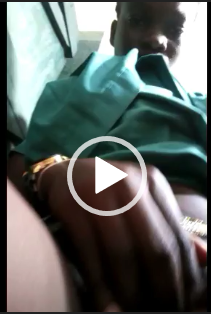Zimbabwe fuel protests: MDC opposition office torched
The main office of Zimbabwe’s opposition party, MDC, has been torched following protests sparked by the more than doubling of the fuel price.
Photos taken at the scene show security gates torn down, windows smashed and burnt debris on the floor.
Several people have been killed and hundreds arrested following protests in the capital, Harare, and Bulawayo.
Social media platforms have been blocked and businesses have closed as police patrol the streets.
The government has blamed the opposition and political rights groups for Monday’s violence.
It is not clear why the opposition’s headquarters would have been targeted.
- Africa Live: More on this story and others from the continent
- How African governments block social media
Security Minister Owen Ncube confirmed there had been deaths but did not give an exact death toll.
He blamed opposition figures and political rights groups for the violence and said an investigation was under way.
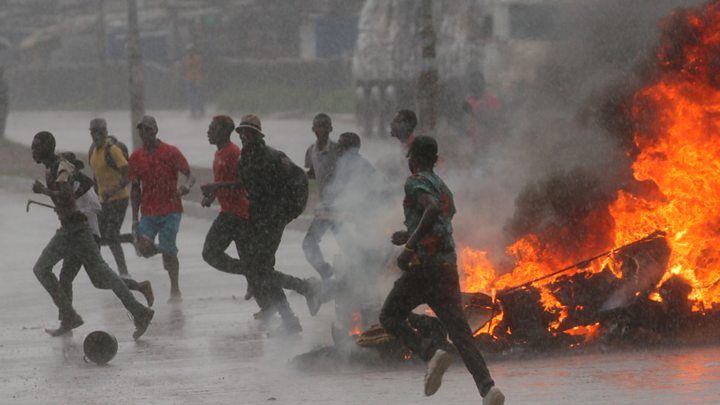
Zimbabwe’s governing Zanu-PF party says its property has also been damaged.
President Emmerson Mnangagwa – who is trying to revive Zimbabwe’s struggling economy – said the fuel price rise was aimed at tackling shortages caused by an increase in fuel use and “rampant” illegal trading.
Protesters accuse the president of not understanding their situation.
For a second day residents in the suburb of Epworth in the capital are back on the streets and businesses remain shut in the capital and Bulawayo, the BBC’s Shinagi Nyoka in Harare reports.
‘Goodwill squandered’
By Andrew Harding, BBC News
 Image copyrightEPA
Image copyrightEPATheir own government had told them as much, warning that – after the failures of the Mugabe era – the economy was in crisis, the state was broke, and tough reforms would now be required.
But in the space of a few chaotic months, Zimbabwe’s new leaders seem to have squandered any public trust or goodwill.
The clumsy handling of a currency crisis has left most people struggling to afford basic goods.
Fuel shortages, the imposition of new taxes, and a sudden, extravagant fuel price hike, have cause more genuine hardship.
The president and his ministers have not helped matters by chartering jets, and buying new cars, while urging the public to travel by bicycle to save money.
It’s a sharp contrast to a decade ago, when a unity government dragged Zimbabwe out of a similar crisis and ministers took drastic pay cuts.
Today the authorities are accusing the opposition and human rights groups of orchestrating the violence. It is beginning to look and sound very much like the old Zimbabwe.
Zimbabwe is experiencing high inflation while wages have stagnated.
The southern African nation faces a severe shortage of US dollar cash and confidence in its bond notes, which are supposed to be worth the same as the dollar, is low.
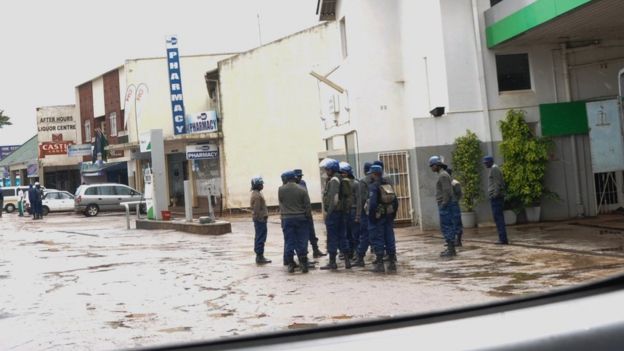 Image copyrightBONGANI KUMBULA
Image copyrightBONGANI KUMBULAThe bond notes, or “bollars”, have lost value because of a lack of foreign currency backing the note, and are now worth much less than a dollar.
Zimbabwean companies are also not producing enough to satisfy local demand or to earn foreign currency by exporting goods. Instead, the country is importing more than it is exporting and struggling to pay.
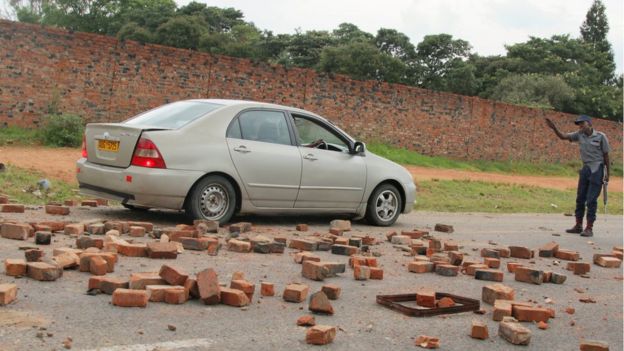 Image copyrightREUTERS
Image copyrightREUTERSPeople ‘sponsoring’ unrest
In a televised address on Saturday, President Mnangagwa said the fuel price hike would address the ongoing fuel problems, which have seen motorists queuing for hours at petrol stations.
He said the government would crackdown on “elements bent on taking advantage of the current fuel shortages to cause and sponsor unrest and instability in the country”.
The hike means petrol prices rose from $1.24 (£0.97) a litre to $3.31 , with diesel up from $1.36 a litre to $3.11.
“People are protesting now that things are hurting. People are suffering,” a resident of Epworth told our reporter.
‘Where is the president?’
He added that the government does not seem to have solutions to their problems and called on it to step down.
Many protesters said the president – who left the country on Sunday for a trip to Russia and several central Asian countries – should have cancelled his trip to deal with the crisis.
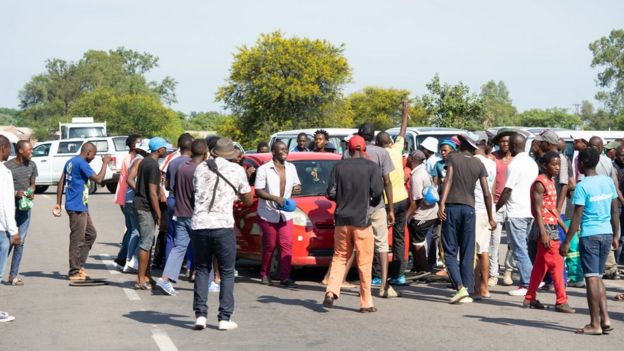 Image copyrightAFP
Image copyrightAFP“We want Mnangagwa to know our displeasure in his failure,” an angry Mthandazo Moyo in Bulawayo told news agency AFP.
“[Former President] Mugabe was evil but he listened,” he added.
Nelson Chamisa, the leader of the main opposition Movement for Democratic Change said: “We have a national crisis which is descending into a humanitarian crisis.”
Mr Mnangagwa came to power in November 2017 after long-time ruler Robert Mugabe resigned following a military takeover and mass demonstrations.
He won a controversial poll last year that was marred by violence and claims of election rigging.
BBC

-
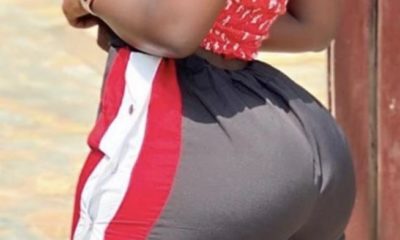
 Lifestyle3 weeks ago
Lifestyle3 weeks agoRoad Safety Authority narrates how buttocks causes road accident
-
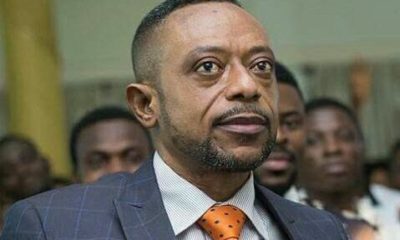
 GENERAL NEWS1 month ago
GENERAL NEWS1 month agoWhy 15 police officers stormed Owusu Bempah’s church – Kumchacha narrates
-
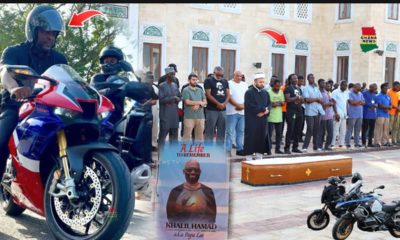
 GENERAL NEWS3 weeks ago
GENERAL NEWS3 weeks agoWatch how Ibrahim Mahama rode Honda superbike to pay last respects to late friend
-
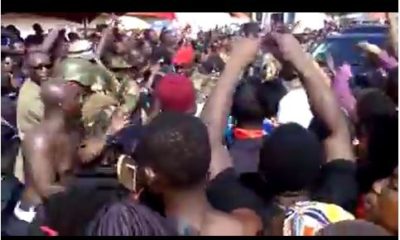
 GENERAL NEWS1 month ago
GENERAL NEWS1 month agoHow Offinso residents storm destooled queen mother’s house, demand for new chief
-
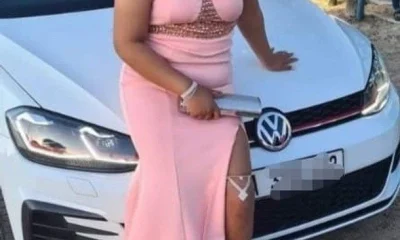
 South Africa News4 weeks ago
South Africa News4 weeks agoWoman thrown out of a speeding taxi while on her way to work
-
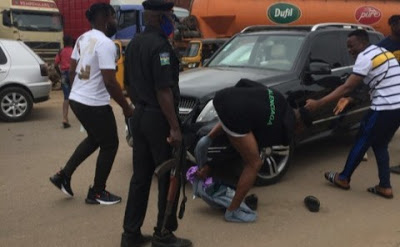
 GENERAL NEWS7 days ago
GENERAL NEWS7 days agoDeadly clash between youth and navy personnel results in two deaths at Tema Manhean
-
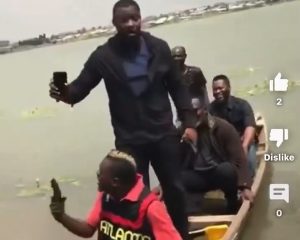
 SHOWBIZ KONKONSAH1 week ago
SHOWBIZ KONKONSAH1 week agoJunior Pope’s Death: Video of John Dumelo refusing to join canoe for movie shoot over safety concerns resurfaces
-
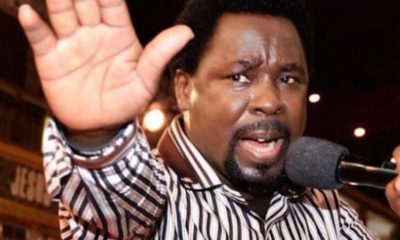
 News Africa2 months ago
News Africa2 months ago‘Satanically dubious’ – SCOAN releases statement on BBC’s report about TB Joshua, church


